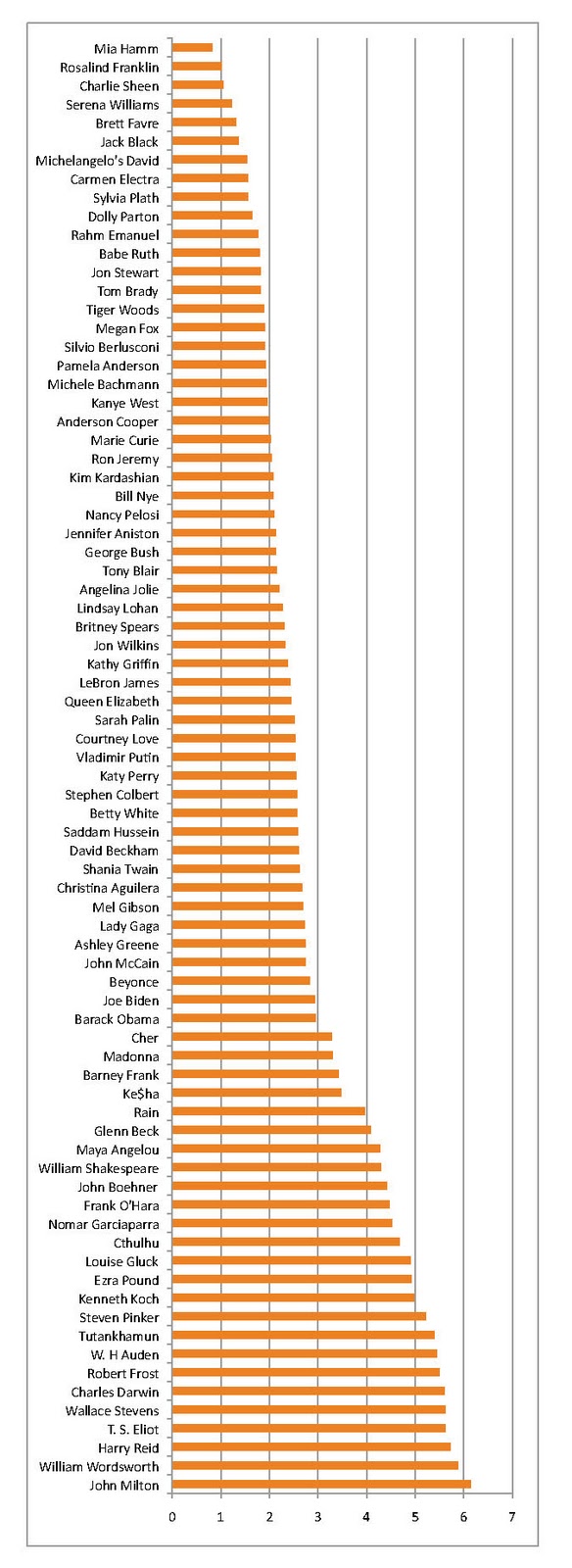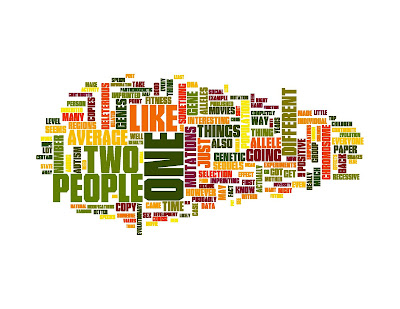So, one of the interesting things about having a website is that you can track the keywords that people Google that lead them to you. I get a lot of hits from people searching on “Jon Wilkins naked.” It turns out that’s not as exciting as it sounds. One of the other Jons Wilkins is one of the cofounders of the marketing firm Naked Communications. So, I assume that some fraction of those people were actually looking for him.
It got me interested, though, in the relative web presences of “Jon Wilkins” and “Jon Wilkins naked,” and, by extension, in the relative naked and non-naked web presences of people in general. I’m going to call this the Negative Log Google Naked Ratio (NLGNR): the ratio of the number of hits when you Google “[Person’s Name] naked” to the number of hits when you just Google “[Person’s Name]” in log base 10. Negative.
Here’s an example. When I searched for “Kanye West” today, Google found approximately 38,600,000 hits. I then searched for “Kanye West naked” and got approximately 428,000 hits. The ratio of these two is about 0.011088, and the logarithm base 10 of that is about –1.95.
So, Kanye West’s NLGNR is 1.95.
If your NLGNR is 1, that means that 10% of all of the hits for your name actually come from pages where your name is followed by the word “naked.” If your NLGNR is 2, it is one in a hundred pages. NLGNR of 3 means one in a thousand, and so on.
Just like in golf, low scores are better, assuming that your goal is to have your internet presence primarily associated with nakedness.
I did this for 93 people, and I have to tell you the internet is a weird place. Before presenting the whole chart, here are some of the highlights.
Top among the people I surveyed was Mia Hamm, whose NLGNR is an impressive 0.83. That means nearly 15% of the sites containing the phrase “Mia Hamm” contain the phrase “Mia Hamm naked.” Weird? No. That actually seems low to me.
Mia’s equally dreamy husband, Nomar Garciaparra, came in 64th, at 4.52.
Number two on the list, just behind Mia Hamm? Rosalind Franklin, who edges out Charlie Sheen. Umm.
Where is Jon Wilkins in all this? My NLGNR is 2.32, just behind Angelina Jolie, Lindsay Lohan and Britney Spears, and just ahead of Kathy Griffin, LeBron James and Queen Elizabeth.
Other weird stretches: just behind Kanye West come, in order, Anderson Cooper, Marie Curie, Ron Jeremy, Kim Kardashian, and Bill Nye.
Yes, Bill Nye the Science Guy has almost as high a ratio of naked to non-naked web hits as porn icon Ron Jeremy. And, yes, both of them have lower ratios than Marie Curie.
Betty White beats out Saddam Hussein and David Beckham.
Barney Frank beats out Ke$ha.
Glenn Beck beats out Maya Angelou, but just barely.
Most of the poets appear way down at the bottom of the chart, which makes you wonder, what’s the point of being a poet at all.
Evolutionary biologists did even worse, with many having absolutely no naked internet presence.
A bunch of people actually returned zero naked hits, giving them infinity for their NLGNR. Most impressive among these was “Ted Williams,” whose nearly 46 million hits cover both the Red Sox legend and the golden-voiced, formerly homeless internet sensation. Others, from most non-naked hits to least, include: Jerry Coyne, James Watson, Francis Crick, HRP-4c, J. B. S. Haldane, Stephen Jay Gould, Louis Macneice, E. O. Wilson. John Ashbery, Doris Kearns Goodwin, Jorie Graham, Ronald Fisher, Sewall Wright, and Richard Lewontin.
I’m afraid I could not bring myself to do the analysis for Justin Bieber.
 |
| The 78 finite NLGNR scores at time of publication |
Find any other interesting NLGNR scores? Add them in the comments.



